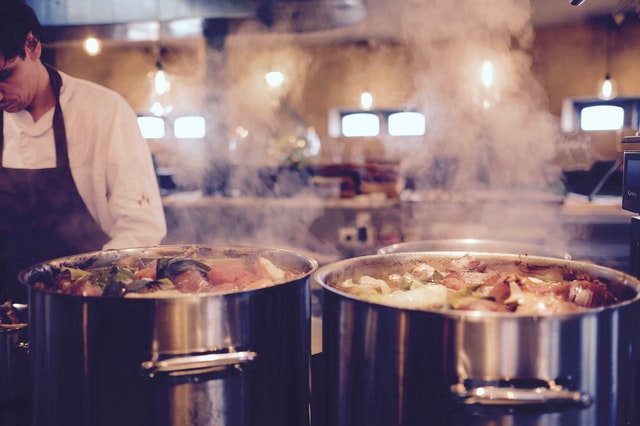
13 Apr Fighting fire in commercial kitchens
The good news is that necessity is the mother of invention, especially in the kitchen!
Over the past few weeks, since the outbreak of the COVID19 disease in Malta, we have witnessed different reactions by businesses as they try to turn around the crisis into at the very least an opportunity to continue with some level of activity, maintain sales and generate some revenue.
It is therefore not surprising to see that a number of restaurants in Malta have re-purposed their main activity and have very quickly adapted to offer a new menu of food, for take away or for delivery, straight to the convenience of their customers’ doors.
When do I need to think about fire safety in the kitchen?
The question of whether the kitchen of a commercial establishment such as a restaurant, a takeaway outlet or a catering centre, is well protected against fire incidents is something that a business owner needs to ask right at the start of the project, when he or she is still making plans, getting approvals and permits from authorities, looking into insurance and other risk management options, etc.
Now that, with the restaurant seating area switched off, the kitchen is more than ever under the spotlight, it is also a very good opportunity to consider whether your restaurant kitchen is as safe from the risk of fire as it should be.
How do I deal with the problem of kitchen fires?
There are many aspects to be considered when dealing with the possibility of fire hazards in commercial kitchens. In fact, one of the strengths of a building services engineer who specialises in fire safety is that he or she is trained and knowledgeable in these different areas, and can easily integrate all the different systems and components in a single design. This is because the fire engineer is in a position to understand the needs of the different people – the restaurant owner, the suppliers, the contractors, the authorities’, the kitchen workers, the diners, and the neighbours – and is able to translate these different needs into a system that works well for the occasion, is compliant with regulations and permit conditions, is fit for the site in question and the space that is available, is reasonably priced, and is made up of parts with the correct technical specifications.
It is a bit like trying to fit together the pieces of a puzzle, so that the restaurant or catering business can focus on guaranteeing customers the best food and the most pleasurable dining experience it can offer. This is only possible when other problems as a result of fire incidents, such as injury, damage to property, downtime, and financial difficulties, have already been thought of, and are either resolved or being prevented from happening.
What causes a fire in the kitchen?
In a restaurant kitchen, very often a fire starts either when garments and other combustible materials catch fire from the cooking range, or because oils and greases that deposit on the insides of the kitchen extract duct system catch fire. This happens when the kitchen extract fan motor has become overloaded or overheated, or when hot splinters from the cooking surface such as charcoal or wood burning grilles escape and enter into the extract ducts and cause ignition.
In the cases of kitchens with gas utilising appliances, the situation might be even more complicated because it is too dangerous for the person who is nearby to approach the appliances in order to switch off the gas and stop the gas supply, making it more difficult to extinguish the fire.
How do I prevent my kitchen from catching fire?
A qualified and highly experienced fire engineer will design your system for firefighting with three rules in mind: prevent, detect and control the spread of fire, and use the proper fire extinguishing system.
Prevention, prevention, prevention
The heart of prevention lies in the careful design and use of extract duct materials that reduce the buildup of grease deposits and allow for the extract systems to be cleaned of these deposits. It is also important to be able to choose the appropriate type of extract fan motor and electrical power system that reduces the risk of overheating of the fan motor. This is where your trusted engineer who is competent in both fire safety and HVAC can give you valuable advice.
Early warning and control
Even in normal conditions, the kitchen is already a place where heat and fumes from cooking create discomfort and make it difficult for the chefs to see properly. This is precisely where the design and installation of a suitable flame detection system comes in. The fire engineer will also advise on systems that can be coupled with manual fire alarm detection, systems that are programmed to switch off the gas supply and deactivate ventilation fans, and the best choice and location of detection devices to avoid unnecessary ‘false’ detection.
The right fire extinguishing system for a commercial kitchen
The type of fire fighting measures and ultimately the overall fire extinguishing system that your engineer will design and recommend, ranging from manually operated equipment such as fire blankets and portable fire extinguishers to automatic or remotely activated systems such as hood mounted wet-chemical fire extinguishing systems, depend on the type of cooking that shall take place in that kitchen – grilling over charcoal or wood, deep frying in boiling oil, etc.
Put your mind at rest
With an understanding of how a fire starts, behaves, and needs to be controlled, the specialist fire engineer can advise on the right systems and materials to use to combat fire in case of an accident, to prevent fire in the first place, and to help you put your mind on what you do best – offer great food to your satisfied customers, wherever they are.

